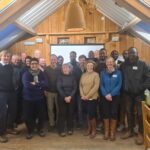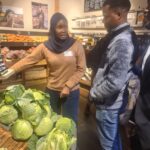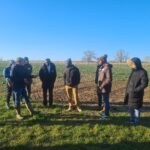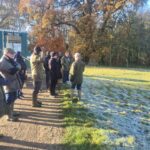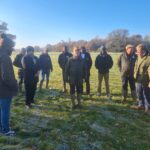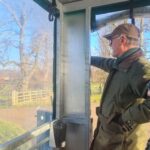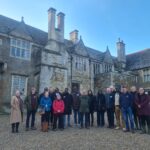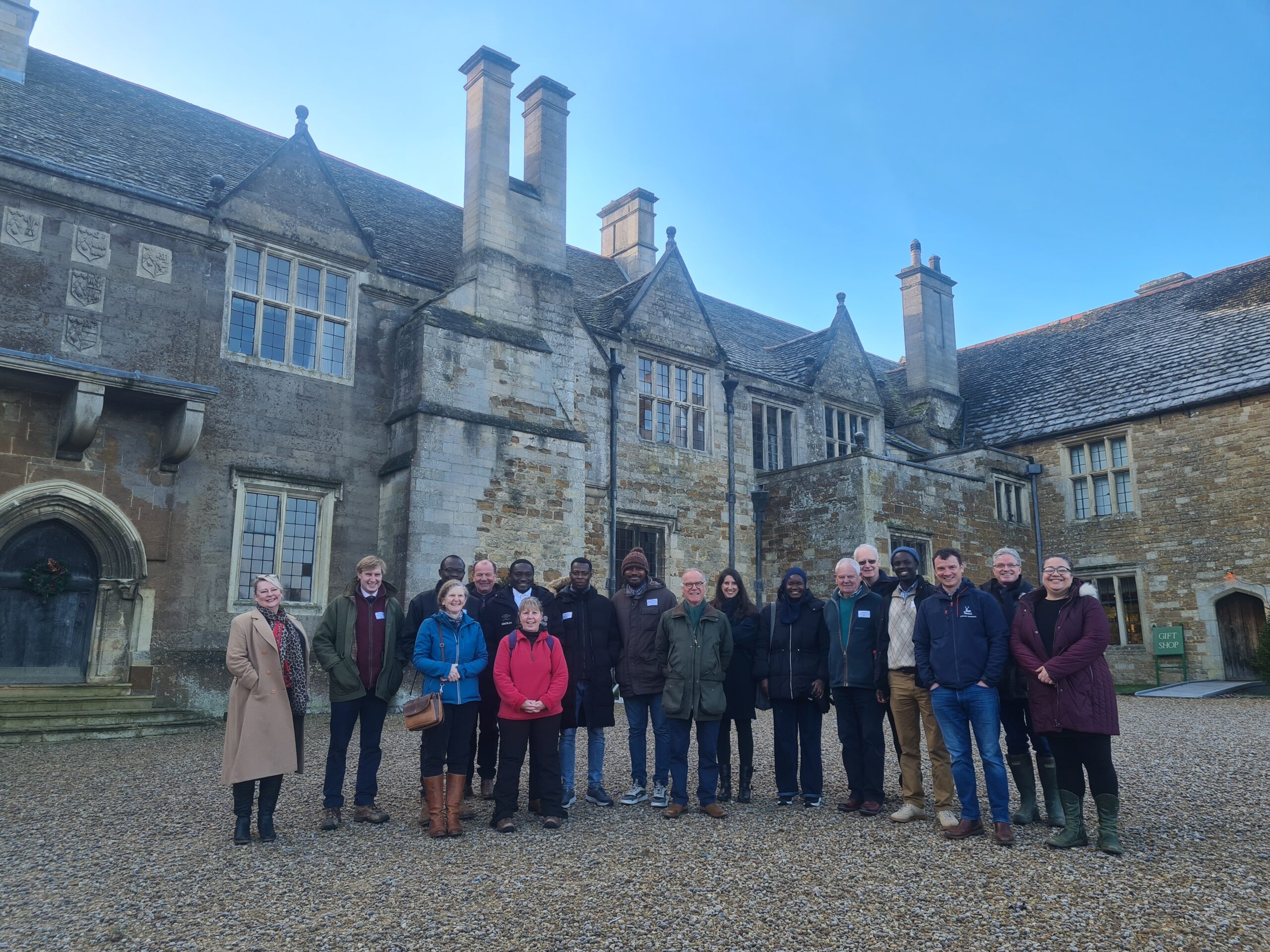
Leicestershire farm businesses support agricultural charity to improve food security in developing countries
Seven students from Nigeria, Uganda, Sierra Leone and Zimbabwe spent a day in Leicestershire earlier this month, as the Marshal Papworth Fund hosted its annual ‘Welcome Visit’ for its latest Masters scholars at Rockingham Castle Estate and Farndon Fields Farm Shop.
The students have just embarked upon year-long MSc courses at Bangor University, Cranfield University, the Royal Agricultural University, the University of Reading, and Writtle University College, where they are studying a range of horticultural and agricultural courses, funded by agricultural development charity, the Marshal Papworth Fund, which is managed by the East of England Agricultural Society.
Sandra Lauridsen, Marshal Papworth Fund coordinator, said: “This welcome visit for our Masters scholars is vital to help cement working relationships between our alumni, which will lead to the best possible outcomes once they return to their home countries. We are so grateful to the teams at Rockingham Castle and Farndon Fields Farm Shop for giving up their time and experience towards our vision of helping more communities in ‘growing out of hunger’.”
At Rockingham Castle, the students were given a guided tour of the prestigious 950-year-old castle by James Saunders-Watson, the current custodian in a 500-year history of his family in residence, before a tour of the diversified estate and farm, alongside James Green of Conant Farming, who farm the estate.
Mr Saunders-Watson explained: “Thirty years ago the farm was the primary income stream, but we have had to diversify the business in recent years, with income from events, the house tours and residential and commercial lettings becoming increasingly important. With a reduced income from the traditional farm enterprise, we have adopted Mid-Tier Countryside Stewardship and the Sustainable Farming Incentive (SFI) to secure a more resilient future for the farmland. This allies with our longer-term wildlife and conservation aims, and helps to improve the land, which is historically very heavy soil from historic stock grazing.”
Conant Farming’s Director of Farms, Mr Green, further explained the SFI programme to the scholars: “We are constantly looking to improve the soil here, with real attention to detail across our operations. We are using less productive areas of the farm for conservation projects, as well as using companion and cover cropping as part of a seven-year crop rotation, all aimed at reducing our grass weeds burden whilst improving the soil and attracting pollinators. The lack of government direction on agricultural policy has been one of our biggest challenges – it is hard to make long term plans, but improving the soil would always be up there anyway.”
The students were particularly interested in the companion cropping experience and were keen to see how this might be transferable to their rotations at home.
The group then headed to Farndon Fields Farm Shop, a family business that has just celebrated its 40-year anniversary, where following a traditional Christmas lunch, the Farndon Fields team – Kevin and Milly Stokes, with their son Oli – guided the students through what it has taken to develop their successful business.
Exploring opportunities to better market their communities’ produce is one of the ways that Marshal Papworth scholars will improve food security when they return to Africa, so the direct-to-customer approach of the Stokes family was of great interest to the scholars. First generation farmer and business founder, Kevin, said: “For us, selling direct to our customers, rather than to the supermarkets, is not only the most lucrative option, but also allows us to grow small runs of a range of different crops – giving huge choice to our customers and spreading the risk for us too, we can afford to try some of the quirkier and heritage varieties that the supermarkets wouldn’t be interested in.”
“We have taken risks over the years when there weren’t a lot of farmers doing what we have, adding a restaurant in 2014 to add that ‘destination experience’ opportunity for our customers. We have to work really hard to show people that we do actually farm ourselves – the farm is directly behind the shop and not immediately obvious in this largely residential part of Market Harborough – but we are still really passionate about growing our own produce and doing what the supermarkets don’t do, and sharing that message with our loyal customers.” Growing their own has also put the business in charge of its supply chain, which came into its own during the pandemic, when Farndon Fields was able to pivot the business and further grow both the farm shop and their delivery service, meaning that most of the 75-strong team of staff were kept in employment.
When developing business ideas, Kevin and Milly’s son, Oli, advised: “Try not to copy other people’s ideas, as you will be behind the curve as soon as you copy them. Instead try to look at adding value where you can, and also develop a clear end-to-end ethos to help minimise waste. We introduced Berkshire pigs in 2012, not only for their fantastic taste but also to help minimise waste from the fields.”
With Oli joining the business in recent years, the farm is adopting regenerative farming methods, and hopes to become a ‘demonstration farm’ for the local area, something the Marshal Papworth students were keen to hear more about as peer-led farmer training plots are one of a reliable way to share knowledge and practical experiences across Africa.
Bashir Ayobami Ibrahim, studying an MSc Conservation and Land Management at Bangor University, and from Nigeria, led the thanks for the day’s experience: “We are truly grateful to hear and see such inspiring stories at both businesses today, all facilitated by the Marshal Papworth Fund and East of England Agricultural Society. This has been a wonderful experience so far, and I know I speak for all of us when I say we are already looking forward to going home and implementing what we have learnt.”
The Marshal Papworth Fund, an agricultural development charity that provides life changing scholarships for students from developing counties at leading UK agricultural and horticultural universities and colleges, has this year celebrated the arrival of its 250th student – a landmark milestone for a charity that initially aspired to provide scholarships for just a handful of farmers 20 years ago.
The Marshal Papworth Fund provides scholarships for students from developing countries, including year-long Masters MSc scholarships to leading UK agricultural universities and colleges, and a bespoke 10-week short course, developed with Harper Adams University. The Fund has just welcomed its 250th student to be educated at UK agricultural universities as part of the Marshal Papworth Fund scholarship schemes.
To find out more about supporting the Marshal Papworth Fund, please contact Sandra Lauridsen on 01733 961024 or email slauridsen@eastofengland.org.uk for more information. You can also visit our new website at www.marshalpapworth.com


